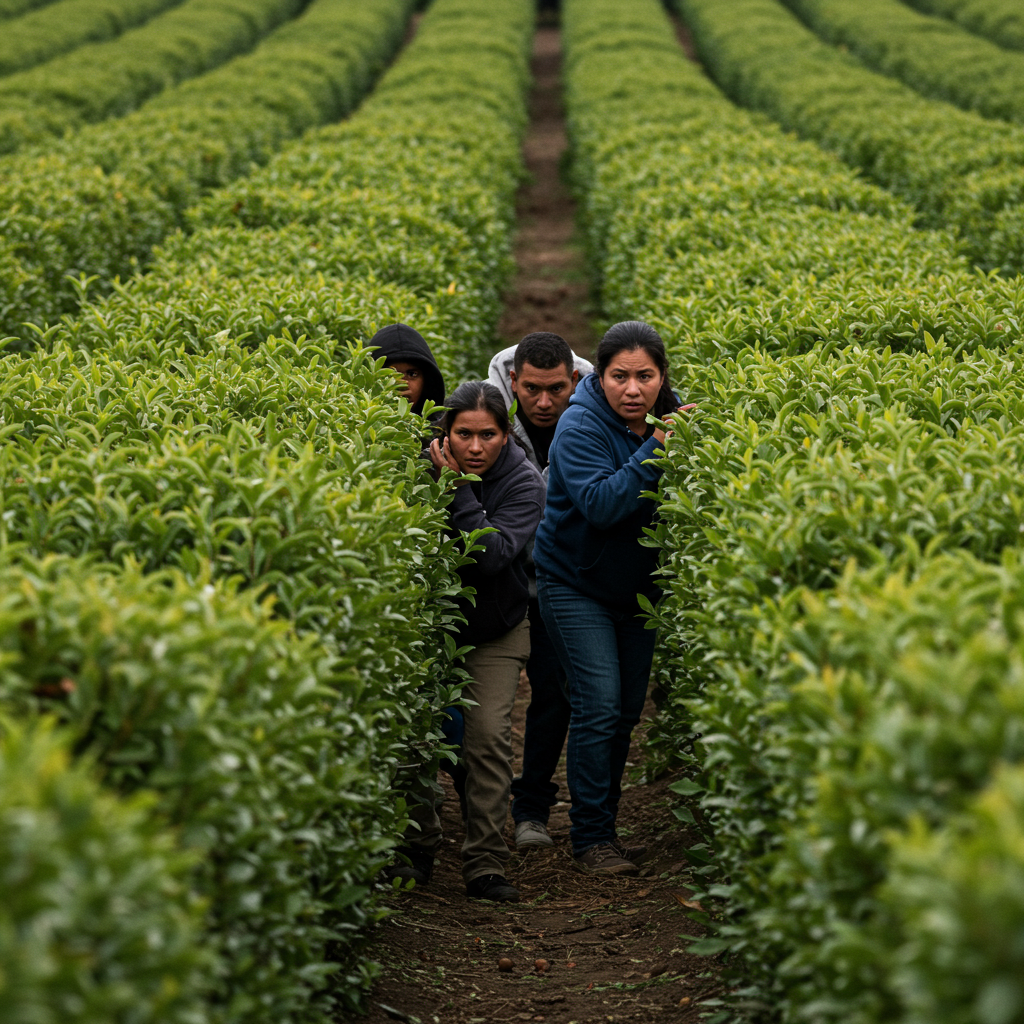Kneeling motionless between endless rows of fruit bushes, almost entirely hidden from view, a question hangs heavy in the humid California air. “Are you from ICE?” a farm worker asks, her voice laced with fear. This isn’t an isolated moment of anxiety; it’s the pervasive reality gripping California’s agricultural heartland.
In Oxnard, a town proudly claiming the title of the “strawberry capital of the world,” fear has driven farm workers deep into the shadows. The woman, an undocumented migrant from Mexico picking berries, has been in the US for two years. Her fear is palpable after a week of escalated activity by US Immigration and Customs Enforcement (ICE), including raids on nearby farms. As her shift ended, she and her co-workers hid, waiting for a ride, unsure if it was safe to even step into the parking lot.
Escalating Enforcement and the Climate of Fear
This climate of terror isn’t new, but its intensity has surged. Local activists reported that in the week preceding this account, ICE agents visited nine farms in the Oxnard area. While they were denied entry to the farms without warrants, agents arrested 35 individuals on nearby streets.
Large-scale workplace raids in California’s agricultural sector haven’t been common for 15 years, according to Lucas Zucker, a community organiser in the Central Coast region. However, that seems to have changed dramatically. Zucker describes the current operations as indiscriminate “sweeping through immigrant communities like Oxnard… looking for anyone they can find to meet their politically-driven quotas.”
Workers like the woman in the field express feeling criminalized. “They treat us like criminals,” she says, “but we only came here to work and have a better life.” She, like many, left children behind in her home country with the hope of returning one day. Now, the fear extends beyond the fields. “We don’t want to leave the house anymore. We don’t want to go to the store. We’re afraid they’ll catch us.”
A Broader Crackdown
These local raids are part of a wider, intensified immigration enforcement strategy. Reports indicate officials were directed to significantly increase daily arrests of undocumented immigrants, moving from roughly 660 to a target of up to 3,000 nationwide. This push includes a heightened focus on workplace raids, a shift from previous enforcement patterns.
While authorities highlight the arrest of individuals with criminal histories, data from the Transactional Records Access Clearinghouse (TRAC) at Syracuse University suggests a significant portion of those detained have no criminal record beyond immigration violations. Approximately 44% of individuals in ICE detention facilities at one point had no criminal history beyond entering the country without permission. Officials have sometimes referred to these arrests as “collateral,” arguing agents cannot legally encounter undocumented immigrants and not detain them. For the workers hiding in the fields, this distinction offers little comfort; the consequence – detention and potential deportation – feels the same as being treated like a criminal.
Impact on the Ground: From Fields to Businesses
The immediate impact in Oxnard is visible. Tractors and trucks sit idle as an unknown number of workers choose to stay home, too afraid to work. A video circulating online shows a man being chased and arrested by agents in a foggy field, a stark visual of the heightened enforcement. Even official vehicles, like a US Customs and Border Protection truck seen outside a produce trucking company, add to the anxiety, even if their presence is officially denied to be immigration-related.
The fear extends far beyond the farms, creating a devastating ripple effect through the community. Raquel Pérez, watching from her family’s Mexican restaurant, Casa Grande Cafe, saw masked agents attempt to enter a nearby packing facility. Now, her once-bustling lunch hour sees only a single customer. She estimates at least half of her regular clientele are undocumented farm workers. “No one came in today,” her mother, Paula Pérez, notes, adding, “We’re all on edge.”
Raquel is more worried about the future of her restaurant now than she was during COVID-19 lockdowns, when farm workers continued their essential labor. She understands the interconnectedness: “If the strawberries or vegetables aren’t picked, that means there’s gonna be nothing coming into the packing houses. Which means there’s not gonna be no trucks to take the stuff.” This domino effect has already hit other businesses; an adjacent pallet supplier is closed, and a local car mechanic is also affected.
Even those working independently feel the pinch. Óscar, an undocumented migrant selling strawberries from his truck, reports a significant drop in business because people are too scared to go out. Providing for his US-born children keeps him going, but the raids have complicated his hopes of legalizing his status. With reports of agents waiting outside courthouses where migrants might pursue paperwork, Óscar feels trapped, unsure how to proceed legally. “There aren’t many ways left to be here legally,” he says.
National Implications and Political Battles
The fear gripping California farm country is mirrored in other communities nationwide, from agricultural areas to urban centers. Increased enforcement has sparked protests in major cities, sometimes leading to violent clashes between demonstrators and federal agents, who have used flash bangs and tear gas.
The federal response has been swift and, at times, controversial. Over the objections of local and state officials, including California’s Governor, federal authorities have deployed National Guard soldiers and even placed Marines on high alert in response to unrest. The administration has framed such protests as “left-wing lawlessness,” suggesting a willingness to use assertive force and even consider rarely used powers like the Insurrection Act, which permits the use of active-duty military for domestic law enforcement, to address immigration situations. This robust approach signals a political battle the administration appears eager to wage, viewing “law and order” and aggressive immigration enforcement as key issues.
Even the White House has acknowledged the economic consequences. Despite campaigning on mass deportations, President Trump noted the negative impact on the farming sector, stating, “Our farmers are being hurt badly. You know, they have very good workers… They’re not citizens, but they’ve turned out to be, you know, great.” He has floated the possibility of some migrants continuing work if recommended by employers and leaving the US first – a complex proposition for those hiding in fear.
The increased pace of arrests puts immense strain on the immigration system, making it difficult for families to locate detained loved ones, who are sometimes transferred hundreds of miles away. The emotional toll on families is significant, leaving children struggling to understand a parent’s sudden absence.
As the season progresses, the hidden figures among the fruit bushes remain, driven by the necessity to work but paralyzed by the constant threat of deportation. Their fear impacts not just their lives and families, but the very fabric of the communities and industries that rely on their labor.




